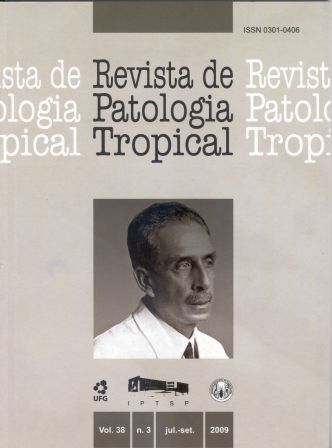Seroepidemiological investigation on visceral larva migrans by Toxocara canis in health service users from Goiania, Brazil
DOI:
https://doi.org/10.5216/rpt.v38i3.7838Keywords:
Toxocara canis, ELISA, Visceral Larva Migrans, Frequency.Abstract
A study on the frequency and risk factors related to visceral larva migrans (VLM)in 1,131 users of public and private laboratories in Goiania, Brazil, was performed. Antibodies anti-Toxocara canis were analyzed from sera by an immunoenzimatic
assay (ELISA) employing as antigen, excretion and secretion products of third
stage larvae of T. canis. In order to decrease the possibility of crossed reactions
with species of Ascaris genera, sera were treated previously with an extract of
Ascaris suum. Samples were considered positive when optical density was above
0.3. Qui-square tests were used for evaluation of differences of proportions.
The frequency found was 18.9% (CI 95% 16.7-21.3). Besides serum collection,
individuals that participated in the study, signed a consent form and were interviewed
for evaluation of the possible risk factors related with the transmission of visceral
larva migrans, such as: presence of dogs in the house and surroundings, history
of living in rural areas, drinking water resources, geophagia, use of river water,
ingestion of vegetables without previous treatment, habit of washing hands before
meals, manipulation of sand or earth. For evaluation of risk factors, odds ratio were
calculated, with the respective confidence intervals of 95%. The presence of dogs
in houses and surroundings, history of geophagia and use of non filtered water were
risk factors statistically significant for transmission of VLM, after adjustment for
possible confounding variables. Even if the percentage of 18.9% of serum positivity
cannot be extrapolated for the urban population of Goiania, results obtained suggest
an elevated frequency of the infection by T. canis in this region.
Downloads
Downloads
Published
How to Cite
Issue
Section
License
The manuscript submission must be accompanied by a letter signed by all authors stating the full name and email address, confirming that the material has not been published or is under consideration for publication elsewhere, and agreeing to transfer copyright in all media and formats for Journal of Tropical Pathology. The authors will not be paid for published articles. They are solely responsible for the content of those articles, even if the Editor holds the right to adjust them to the norms of the journal.
The reviewers will not be paid for the peer review process.

